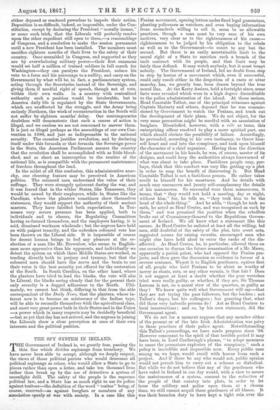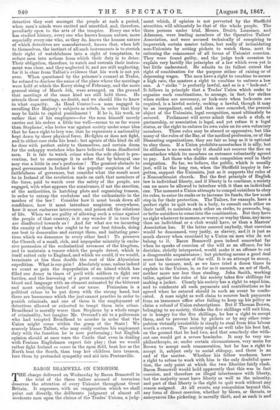TIM SPY SYSTEM IN IRELAND.
HE
Government of Ireland is, we greatly fear, passing the thin line which divides espionage from treachery. We have never been able to accept, although we deeply respect, the views of those political purists who would denounce all political espionage as crime, who would allow a State to go to pieces rather than open a letter, and take ten thousand lives rather than break up by the use of detectives a system of moonlight drill. The safety of the people is the supreme political law, and a State has as much right to use its police against traitors—the definition of the word " traitor" being, of course, reserved—as against burglars or members of any association openly at war with society. In ,a case like this
Fenian movement, opening letters under fixed legal guarantees, planting policemen as watchers, and even buying information from scoundrels willing to sell it, seem to us allowable practices, though a man must be very sure of his own motives, very clear as to the righteousness of his cause, righteousness to be judged by his obligation to the rebels as well as to the Government—to resort to any but the second. But there is an easily ascertainable limit to the moral right of a State to sanction such a breach of the tacit contract with its people, and that limit may be fairly thus defined. It may watch anybody, but it must tempt nobody. The Government of Ireland, led no doubt from step to step by horror of a movement which, even if successful, could only result either in the despotism of a caste or utter anarchy, has, we greatly fear, been drawn beyond the true moral line. At the Kerry Assizes, held a fortnight since, some facts were revealed which were in a high degree discreditable to the police administration of the island. At those assizes, Head Constable Talbot, one of the principal witnesses against Captain Moriarty and others, deposed that he was commis, sioned by Government to watch the Fenians, and track out the development of their plans. We do not object, for the very same precaution might be needful with an association of burglars. Dissatisfied, however, with a role so tame, this enterprising officer resolved to play a more spirited part, one which should obviate the possibility of failure. Accordingly, he pretended, according to his own testimony, to throw him- self heart and soul into the conspiracy, and took upon himself the character of a chief organizer. Having thus the direction of the movement in his hands, he was, of course, master of its designs, and could keep the authorities always forewarned of what was about to take place. Fastidious people may, per- haps, think that this conduct was very like getting up a plot in order to reap the benefit of discovering it. But Head Constable Talbot is not a fastidious person. He rather takes credit to himself for his smartness. And he details with much easy unconcern and jaunty self-complacency the details of his manoeuvres. So successful were these manoeuvres, it seems, that " they would not hold a meeting, day or night, without him," for, he tells us, " they took him to be the head of the whole thing." And he adds, " though he took no oath, he acted as Head Centre, and was recognized as such by them," and was promised the position when the rebellion broke out of Commissary-General to the Republican Govern- ment of Ireland. We all know what a statement like this means. As Head Centre he enlisted at least all the willing, led men, still doubtful of the safety of the plot, into overt acts, suggested means for raising recruits, encouraged men who might else have held aloof to enter the ranks of the dis- affected. As Head. Centre, he, in particular, allowed them on one occasion to discuss the future assassination of a Mr. Mawe, apparently a parish priest, who had opposed the Fenian pro- jects, and then gave the discussion as evidence in favour of a severer sentence. We put it to English gentlemen, squires first of all, people who hold Fenians to be about as worthy of mercy as stoats, rats, or any other vermin, is that fair ? Does it not suggest at least a doubt whether the poor wretches tried were really guilty, or whether, if they are, Sir Thomas Larcom is not, on a moral view of the question, as guilty as they ? We know quite well what Government will say—that they are not trying the poor followers, but the leaders ; not Talbot's dupes, but his colleagues ; but granting that, what did those very imbecile persons do ? Act as Head Centres to local insurrections ; and so, by his own statement, did. the Government agent.
We do not for a moment suppose that any member either of the present or of the late Irish Administration was privy to these practices of their police agent. Notwithstanding this Talbot's proceedings, we have made progress since '98. However consonant to the spirit of that terrible period it may have been, in Lord Castlereagh's phrase, " to adopt measures to cause the premature explosion of the conspiracy," such a policy is incredible and impossible now. Every public man among us, we hope, would recoil with horror from such a project. And if there be any who would not, public opinion would not permit him to carry out a scheme so diabolical. But while we do not believe that any of the gentlemen who have ruled in Ireland in our day would, with a view to assure the maintenance of a system, consent to the seduction of the people of that country into plots, in order to let loose the soldiery and police upon them at a chosen time, we still cannot acquit these gentlemen of all blame. It was their bounden duty to have kept a tight rein over the detective they sent amongst the people at such a period, when men's minds were excited and unsettled, and, therefore, peculiarly open to the arts of the tempter. Every one who has studied history, every one who knows human nature, more especially every one who, as they do, knows the human nature of which detectives are manufactured, knows that, when left to themselves, the instinct of all such instruments is to stretch their right of watchfulness into a right of temptation, to seduce men into actions from which their duty is to deter. Their obligation, therefore, to watch and restrain their instru- ment was clear, and they neglected it, and are still neglecting, for it is clear from Talbot's evidence that his work is not yet over. When questioned by the prisoner's counsel at Tralee, he refused to disclose the name of the place where the meetings were held at which the Kerry rising of February, and the more general rising of March 5th, were arranged, on the ground that meetings of the same kind are still held there. He attends those meetings, no doubt, and we should like to know in what capacity. As Head Centre ?—a man engaged in enrolling Her Majesty's subjects as rebels, in order that they may be liable to capital punishment ? If he is, his work, or rather that of his employers—for the man himself merely carries out his orders a little too well—seems to us far worse than Stephens', who levies war against society under some idea that he has a right to levy war, that he represents a nationality kept down by sheer physical force. He fights or does not fight, and in either case risks his head ; but agents of this kind do all he does with perfect safety to themselves, and certain doom for the unhappy wretches who have believed them disaffected men. It is fair to watch crime when the sole object is pre- vention, but to encourage it in order that by betrayal one may rise a little in one's profession ! The greatest obstacle to good government in Ireland is the popular suspicion of the faithfulness of governors, but consider what the result must be in Ireland of the revelation made on oath that members of the force, paid to watch over the safety of the people, are engaged, with what appears the connivance, if not the sanction, of the authorities, in hatching plots and organizing treason, in order to entrap the credulous and the enthusiastic in the meshes of the law I Consider how it must break down all confidence, how it must introduce suspicion everywhere, how it must embarras intercourse, and poison all the relations of life. When we are guilty of allowing such a crime against the people of that country, is it any wonder if in turn they are disaffected towards us V And for what are we incurring the enmity of those who ought to be our best friends, doing our best to demoralize and corrupt them, and imitating prac- tices which we denounce in every other land To preserve the Church of a small, rich, and unpopular minority in exclu- sive possession of the ecclesiastical revenues of the kingdom, and to maintain a tenure which the people detest, which is itself suited only to England, and which we could, if we would, terminate at less than double the cost of this Abyssinian expedition. What is our gain ? Absolutely none, unless indeed we count as gain the depopulation of an island which has filled our Army in times of peril with soldiers to fight our battles, and the leavening of a great community of our own blood and language with an element animated by the bitterest and most undying hatred of our name. Fenianism is a political crime to be put down with the strong hand, but there are basenesses which the just cannot practise in order to punish criminals, and one of them is the employment of detectives allowed or exhorted to tempt them into crime. Broadhead is morally worse than Stephens by a whole range of criminality, but imagine Mr. Overend's air to a policeman who had tempted Broadhead to murder in order that the Union might come within the grasp of the State ! We scarcely blame Talbot, who may easily confuse his unpleasant duty with the function he is now performing ; but English opinion should at once warn the Castle that even in dealing with Fenians Englishmen expect fair play ; that we would rather fight Ireland en masse in the open field, beat her as the North beat the South, than trap her children into treason, lure them by pretended sympathy and aid into Pentonville.































 Previous page
Previous page